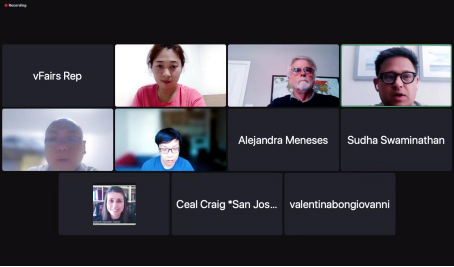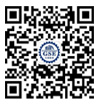Recently, the 2023 Annual Meeting of the American Education Research Association (AERA) was held, and young faculty members of the School of Education, CHEN Jing and MA Yue, attended and presented at the meeting. The theme of the conference is "Interrogating Consequential Education Research in Pursuit of Truth", and the conference will be held in Chicago from April 13 to April 16. The offline conference will be held in Chicago from April 13 to April 16, and the online conference will be held from May 4 to May 5.
In this roundtable, CHEN shared a paper entitled "Congruency Between Adolescents and Teachers in Perceiving Friendships Between Dyads in High School Classrooms. In this roundtable, CHEN shared a study entitled "Congruency Between Adolescents and Teachers in Perceiving Friendships Between Dyads in High School Classrooms". Based on social-ecological systems theory, this study emphasized the importance of peer interactions on adolescents' cognitive and social development and suggested that teachers may be able to shape classroom peer relationships directly or indirectly through classroom management and instructional organization. However, few studies have examined the extent to which teachers are able to agree with students about classroom peer relationships. In response, CHEN used peer nomination and teacher nomination to construct classroom friendship networks based on 5852 binary relationships included in four high school classes, respectively, from student and teacher perspectives.
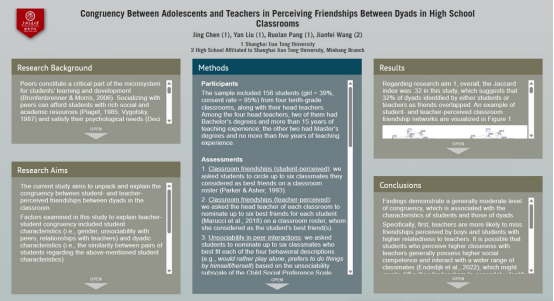
The results of the study showed that, first, there was a moderately weak fit (Jaccard index = .32) between the class friendship networks from both teacher and student perspectives. Teachers missed 59% of nominations in binary relationships with student nominations and 4% of nominations in binary relationships without student nominations for the presence of friendships. Second, the results of the cross-classified multilevel logistic regression model showed that student-level and binary relationship-level traits such as student gender, intensity of peer interaction, and teacher-student relationship explained the differences between teacher and student perspectives. Overall, heterogeneity in traits among students was significantly associated with the probability of teachers missing out on peer friendships nominated by students; conversely, similarity in traits among students was significantly associated with the probability of teachers giving friendship nominations in addition to student nominations. This study highlights teachers' and students' perceptions of classroom social ecology and clarifies the fit and variability of perceptions across perspectives. The findings encourage educators to be more intentional about classroom peer relationships in order to better support students' classroom experiences and learning and development.
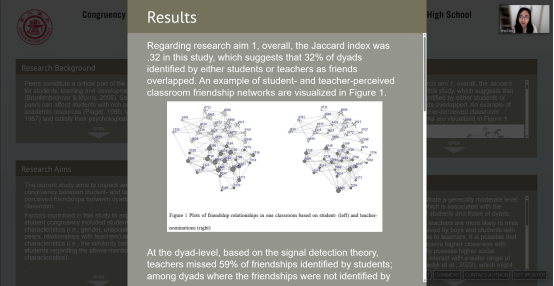
In the "STEM Instruction and Interventions Across Contexts" session of the online conference, Dr. MA Yue presented a paper entitled "The Mediating Role of Science Attitudes in the Classroom". Role of Science Attitudes in the Relationship Between Inquiry-Based Practices and Scientific Literacy".
The paper points out that inquiry-based activities play a very important role in students' science learning processes and outcomes, but the underlying mechanisms are not yet clear. To this end, Ma Yue analyzed the data from eight countries, including China, Japan, Republic of Korea, Singapore, the United States, Germany, Australia, and Finland, through Multilevel Structural Equation Modeling (MSEM) based on the Program for International Student Assessment (PISA 2015). Structural Equation Modeling (MSEM) to explore the mediating role of science attitudes (science interest, science self-efficacy, and instrumental motivation) in the relationship between inquiry-based activities and science literacy.
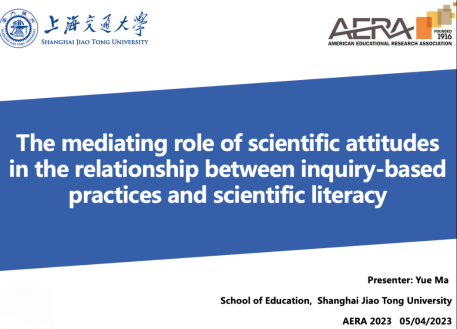
The results of the study indicated that the mediating effects of science interest, science self-efficacy, and instrumental motivation between inquiry-based activities and science literacy were significant. In addition, science inquiry-based activities had a positive direct effect on science attitudes but a negative direct effect on science literacy, and this negative effect may be related to factors such as PISA's focus on the frequency rather than quality of inquiry-based activities measured, its preference for social rather than cognitive level of topic content, and the cognitive load students incur. Science interest and science self-efficacy were also found to promote students' science learning with a significant positive mediating effect, while instrumental motivation had a significant negative mediating effect, which may be influenced by the degree of autonomy in instrumental motivation. The above findings may provide references for a deeper understanding of the nature of scientific inquiry activities and promote students' scientific attitudes and literacy.


